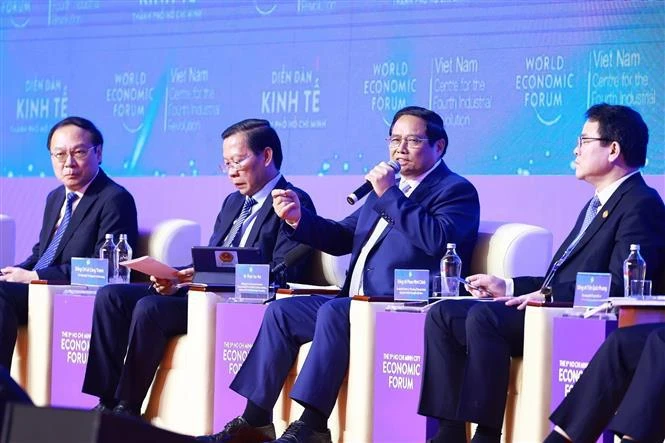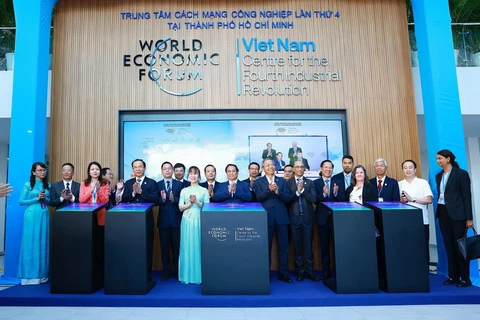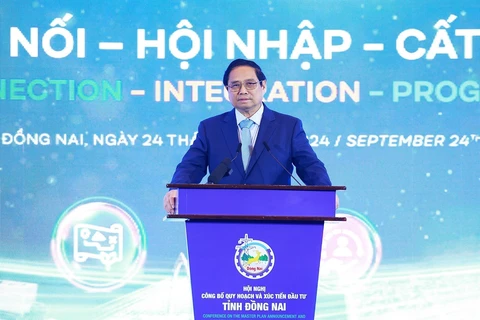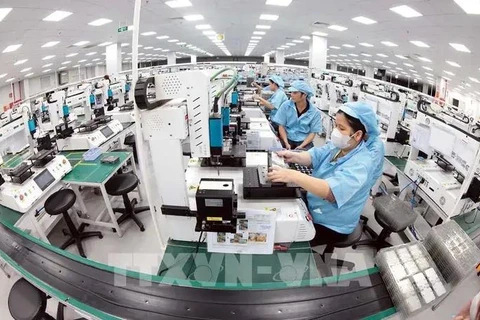
HCM City (VNA) – Prime Minister Pham Minh Chinh cleared up many queries regarding mechanisms and policies at a dialogue with experts and leaders of major groups, both at home and abroad, which took place within the framework of the fifth Ho Chi Minh City Economic Forum on September 25.
Asked about mechanisms and policies to create breakthroughs that would speed up economic transformation, especial in the industrial sector, the government leader cited the resolution adopted at the 13th National Party Congress and Resolution No. 29-NQ/TW dated 2022 on continuing to promote industrialisation and modernisation till 2030, with a vision to 2045.
He highlighted the Government’s efforts in materialising the documents, saying it has employed solutions to optimise Vietnam’s unique potential, special opportunities, and competitive edge, while learning from international experience in this regard.
The Government has focused on building and perfecting institutions, devising mechanisms and policies to mobilise resources for infrastructure development, especially digital, transport, climate-resilient, and social infrastructure, he said, adding efforts have been made to raise administration capacity, promote personnel training, and seek international support.
In the field of science-technology and innovation, Chinh said the Party has seen education-training a top priority, pursuing basic, comprehensive reform in order to promote the sector.
Meanwhile, the Government has institutionalised the perception through laws, mechanisms, policies, and programmes, pooled resources for science-technology development, and offered incentives to those who dare to think, to do, and bear responsibility for the country and the people, according to the PM.
For green economy and circular economy, he emphasised that Vietnam will not pursue economic growth at the expense of the environment, adding policies are needed to encourage public engagement in the economic models.
Responding to the question on the implementation of Vietnam’s commitment to net zero emissions by 2050 at the 2021 United Nations Climate Change Conference (COP26), the PM said the Party Central Committee is working on relevant policies, guidelines, mechanisms, laws, programmes, and plans, and urged localities to actively put them in place, while promoting the participation of people and businesses in this field.
It is a must to conduct energy transition, from carbon-intensive energy to clean and green energy, with a roadmap to phase out coal-fired power plants and replace them with nuclear energy, wind power, solar power, hydrogen, biomass energy, and liquefied natural gas, he said, citing the National Power Development Plan VIII, which guides the development of power plants and power grids between 2021 and 2030, with a vision until 2050, as part of the effort.
Vietnam has also promoted green transportation and major projects on high-speed railways and urban rail systems, during which the country needs the support of international partners, the PM said.
Touching upon Vietnam’s efforts in attracting foreign direct investment (FDI), he affirmed that Vietnam always protects the rights and legal and legitimate interests of businesses.
Concluding the policy dialogue, he lauded HCM City’s contributions to national development, and shared participants’ view on the need for comprehensive industrial transformation in the southern metropolis, aiming to build a civilised, modern city.
He urged the city to build and perfect institutions, develop harmonious and modern infrastructure, focus on training high-quality human resources, implement smart governance, and mobilise resources through enhanced public-private partnership./.






















